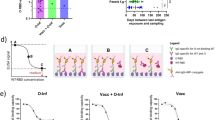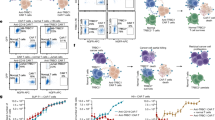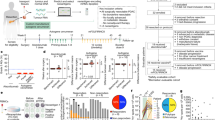Abstract
Cancer patients are more susceptible to SARS-CoV-2 infection and generally have higher mortality rate. Anti-SARS-CoV-2 IgG is an important consideration for the patients in this COVID-19 pandemic. Recent researches suggested the rapid decay of anti-SARS-CoV-2 antibodies in the general population, but the decline rate of the antibodies in cancer patients was unknown. In this observational study, we reported the clinical features of the 53 cancer patients infected by SARS-CoV-2 from Wuhan, China and tracked the presence of anti-SARS-CoV-2 antibodies in the patients for more than 12 months. We found the duration (days) of anti-SARS-CoV-2 IgG in the patients was significant longer in chemotherapy (mean: 175; range: 75 to 315) and radiotherapy groups (mean: 168; range: 85 to 265) than in non-chemo- or radio-therapy group (mean: 58; range: 21 to 123) after their recovery from COVID-19. We also used single-cell RNA sequencing to track the immunologic changes in a representative patient recovered from COVID-19 and found that CD8 + effective T cells, memory B cells and plasma cells were persistently activated in the patient undergoing chemotherapy. Together, our findings show that chemotherapy and radiotherapy might be beneficial to extend the duration of anti-SARS-CoV-2 IgG.
Similar content being viewed by others
Introduction
The emergence of coronavirus disease 2019 (COVID-19), caused by severe acute respiratory syndrome coronavirus 2 (SARS-CoV-2), has led to an unprecedented and ongoing global health crisis1. As of June 30th, 2021, World Health Organization (WHO) reported 19,718,030 confirmed COVID-19 cases in the world, including 3,937,437 deaths2. Cancer is also one of the most prevalent diseases worldwide3. In 2021, 1,898,160 new cancer cases and 608,570 cancer deaths are projected to occur in the United States3.
Cancer patients usually have weakened immune system and autoreactive responses4, and were reported to be more susceptible to SARS-CoV-2 infection and have higher mortality rate compared with regular COVID-19 patients5,6 . Therefore, cancer patients should be monitored more carefully during the treatment5, and the anti-SARS-CoV-2 antibodies are important as they improve the immunity of patients7,8 .Previous studies suggested the memory B cells (MBCs) against SARS-CoV-2 could be enriched for up for six months in the general convalescent patients9, while levels of anti-SARS-CoV-2 IgG antibody rapidly declined as early as three months after infection10,11,12. So far, to our knowledge, the duration of the antibodies in cancer patients has not been well established. In this study, we tracked the anti-SARS-CoV-2 antibodies in 53 cancer patients after their recovery from COVID-19 for more than 12 months, aiming to better comprehend the effects of different treatments on the durability of anti-SARS-CoV-2 antibodies and their impact on the immune system of COVID-19 cancer patients.
Results
Anti-SAS-Cov-2 IgG antibody has longer duration in the patients with chemotherapy and radiotherapy
A total of 53 cancer patients (24 women and 19 men) who were infected by SARS-CoV-2 had serial measurements of IgG (Table 1). Infection was confirmed by polymerase chain-reaction assay in all participants. The mean age of patients was 56 years (range: 33 to 78). The mean duration of IgM is 28 days (range: 15 to 65), and the mean duration of IgG is 137 days (range: 21 to 315). There were 17 non-small-cell lung cancer (NSCLC), 6 breast cancer, 5 colon cancer, 5 cervical squamous cell carcinoma (CSCC) and 20 other types of cancer patients in this study (Supplementary Table 1). When we divided the participants into different groups by treatments, we found the duration of IgG was significantly longer in chemotherapy (mean: 175; range: 75 to 315; p < 0.01) and radiotherapy groups (mean: 168; range: 85 to 265; p < 0.01) than in non-chemo- or radio- therapy group (mean: 58; range: 21 to 123) (Fig. 1) (Table 1). The correlation between chemotherapy (Regression coefficient: 95.655; 95% confidence interval (CI): 35.702 ~ 155.608; p = 0.003) or radiotherapy (Regression coefficient:102.329; 95%CI: 38.107 ~ 166.551; p = 0.003) on antibody duration was further proved by a linear regression model (Table 2). However, we found that the duration of IgG was not significantly correlated with initial IgG levels, gender, cancer type, stage or underlying disease (Table 2).
The immune system is continuously activated in the chemotherapy patient after the recovery of COVID-19
Interestingly, six participants (11.3%) in our cohorts showed durable presence of the anti-SARS-CoV-2 IgGs, which has already lasted for more 240 days (Table 1). Of them, four received chemotherapies, one received radiotherapy and one received both chemotherapy and radiotherapy after COVID-19 recovery. We collected peripheral blood mononuclear cells (PBMC) from one representative chemotherapy patient recoverd from COVID-19 and performed single-cell RNA sequencing. The uniform manifold approximation and projection (UMAP) (Fig. 2a–c) and trajectory analysis (Fig. 2d)showed the CD8 + effective T cells, memory B cells and plasma cells were persistently activated in this patient after chemotherapy.
Dynamic study for the immunologic features in a representative patient infected by SARS-CoV-2 for more than 1 year. This 57-year-old male patient was diagnosed with non-small-cell lung cancer (stage: IIIA) and SARS-CoV-2 infection on February 25, 2020. After recovery from COVID-19, he underwent four chemotherapy cycles (500 mg/m2 pemetrexed combined with 75 mg/m2 Nedaplatin) from August to September 2020. The single-cell sequencing blood collections were conducted both before the chemotherapy (April 16, 2020) and after the chemotherapy (February 28, 2021). (a) UMAP projection of clusters by cell type (15, 015 cells), different colors corresponding to different cell types. (b) UMAP projection of clusters by sample source, red: before chemotherapy; blue: after chemotherapy (February 28, 2021). (c) Percentage of cell composition of each sample before and after chemotherapy; left: proportion of different T cell subset; right: proportion of different B cell subsets. (d) The Monocle 2 trajectory plot showing the dynamics of T cells (left) and B cells (right) in the patient before and after chemotherapy.
Discussion
It has been reported that SARS-CoV-2 could undergo evolution during the treatment of chronic infection13,14,15,16. Anti-SARS-CoV-2 IgG antibodies are important for the immunity of the cancer patients7,8. In this study, we found that the anti-SARS-CoV-2 IgG antibodies decayed fast in the patients without chemotherapy and radiotherapy, which is consistent with the previous finding in the general population10,11,12. However, our findings raise concern that human immunity against SARS-CoV-2 may be long lasting in patients with radiotherapy and chemotherapy. As we know, chemotherapy or radiotherapy can damage the immune system by destroying the hematopoietic stem cells in bone marrow, which may cause immunosuppression7. However, cell death caused by the chemotherapy or radiotherapy might also activate the adaptive immune system17, resulting in immunogenic cell death effect. Lee et al.6 found there was no significant effect on mortality for patients with chemotherapy and radiotherapy use within the 4 weeks after testing positive for COVID-19. Hess et al.18 reported low-dose, whole-lung radiation for patients with COVID-19-related pneumonia appeared safe and might be an effective immunomodulatory treatment. Besides, our group19 and one group in Italy20 showed that very few patients required treatment interruptions in radiotherapy services, and few patients undergoing radiotherapy were diagnosed with COVID-19 during their treatment course (0.48%, 1 of 209 patients)19. Thus, chemotherapy and radiotherapy should be safe treatments for the cancer patient recovered from COVID-19. Interestingly, there is also a report that anti-SARS-CoV-2 antibody triggered the anti-tumor immune response in a Hodgkin's lymphoma patient21. Therefore, the protective role of IgG antibodies against SARS-CoV-2 in the cancer patient is not only important for them to prevent virus infection, but maybe also beneficial for the cancer treatment.
Our study has several limitations. Firstly, this is a multicentric study which performed mainly in two hospitals in Wuhan. We have used different commercial assay Kits to detect anti-SARS-CoV-2 IgG and we could not acquire all the information such as IgG expression levels of patients at each time point. Thus, we mainly focused on the duration but not the expression level of IgG antibody. Secondly, some cancer patients were discharged, died or in unstable physical condition in the process, which resulted in a relatively small sample size. Thirdly, some patients have been used supportive treatments to maintain a normal white blood cell count or hemoglobin level, maintain electrolyte balance and ensure adequate intake. The uncertainties of these different supportive treatments might also affect the duration of anti-SARS-CoV-2 IgG.
In sum, to the best of our knowledge, this study first report that chemotherapy and radiotherapy might provide benefits to prolong the duration of anti-SARS-CoV-2 IgG in human body. This should be important to devise new strategies for cancer treatment and improve antibody therapy in the future. Still, further large-scale investigations on IgG antibodies against SARS-CoV-2 in cancer patients over longer time periods should be done to assess the kinetics of immunity.
Methods
Patient data
We reviewed the medical records, including clinical and treatment data of patients with cancer who were mainly admitted to the Zhongnan Hospital of Wuhan University and Wuhan Tongji Hospital from February 1, 2020, to March 31, 2021. COVID-19 infection was confirmed by polymerase-chain-reaction (PCR) assay. The chat flow of the cancer patients in the study was shown in Supplementary Fig. 1, and the detailed information and clinical features of patients were shown in Supplementary Table 1. During the treatment of patients, venous blood samples were serially collected and analyzed by gold immunochromatography assay (GICA) or enzyme-linked immunosorbent assay (ELISA) or to detect anti-SARS-CoV-2 IgG/IgM. In Tongji hospital, we used one ELISA Kit (EknCov-S1-01, Frdbio bioscience and technology Inc.) and one gold immunochromatography assay (GICA) Kit (200101, Wuhan Easydiagnosis biomedicine Co.Ltd.). In Zhongnan hospital, we mainly used another GICA Kit (20203400240, Zhuhai Livzon Diagnositic Inc.). For the reaction of ELISA22, optical density at 450 nm (OD450) was determined with a multifunctional microplate reader. The cutoff for IgG was 0.30 determined by calculating the mean OD450 of a negative serum sample plus 3 SDs. Duration of SARS-CoV-2 antibody among the patients were recorded. All the patients selected in this study were alive before the cutoff date (March 31, 2021), and verbal informed consent was obtained from all the participants. All methods were carried out in accordance with relevant guidelines and regulations.
Single-cell RNA sequencing
Peripheral blood mononuclear cells (PBMCs) were collected from one representative chemotherapy patient using a Ficoll–Hypaque density solution according to the standard density gradient centrifugation methods. This 57-year-old male patient was diagnosed with non-small-cell lung cancer (stage: IIIA) and SARS-CoV-2 infection on February 25, 2020. After recovered from COVID-19, the first blood collection for single-cell RNA sequencing (Singeron) was conducted on April 16, 2020. The patient underwent four chemotherapy cycles (500 mg/m2 pemetrexed combined with 75 mg/m2 Nedaplatin) from August to September 2020. The second blood collection for single-cell RNA sequencing was conducted on February 28, 2021. After quality control, we used Seurat v3.8 to do data normalization, dimensional reduction, clustering and calculated differentially express genes (DEGs) among clusters. We identified cell types (15,015 cells) base on DEGs and CellMarker database.
Statistics
Statistical analysis in Fig. 1 was performed using Prism 7 software (GraphPad La Jolla, USA). Kruskal–Wallis test followed by Mann–Whitney U test were used, p value less than 0.05 was considered to be statistically significant. Linear regression model in Table 2 was performed by the lme4 and lmerTest packages in R version 3.6.1, p value less than 0.05 means statistically significant.
Study approval
This retrospective study was approved by the ethics committee of Wuhan Tongji Hospital (2020370) and Zhongnan Hospital of Wuhan University (2020039).
Data availability
All data generated or analysed during this study are included in this published article (and its Supplementary Information files).
Abbreviations
- COVID-19:
-
Coronavirus disease 2019
- SARS-CoV-2:
-
Severe acute respiratory syndrome coronavirus 2
- WHO:
-
World Health Organization
- MBCs:
-
Memory B cells
- PBMC:
-
Peripheral blood mononuclear cell
- NSCLC:
-
Non-small-cell lung cancer
- CSCC:
-
Cervical squamous cell carcinoma
- GICA:
-
Gold immunochromatography assay
- ELISA:
-
Enzyme-linked immunosorbent assay
References
Graham, B. S. & Corbett, K. S. Prototype pathogen approach for pandemic preparedness: World on fire. J. Clin. Invest. 130, 3348–3349. https://doi.org/10.1172/JCI139601 (2020).
World Health Organization. https://covid19.who.int/. Accessed 30 June 2021 (2021).
Siegel, R. L., Miller, K. D., Fuchs, H. E. & Jemal, A. Cancer statistics, 2021. CA Cancer J. Clin. 71, 7–33. https://doi.org/10.3322/caac.21654 (2021).
Caspi, R. R. Immunotherapy of autoimmunity and cancer: The penalty for success. Nat. Rev. Immunol. 8, 970–976. https://doi.org/10.1038/nri2438 (2008).
Yu, J., Ouyang, W., Chua, M. L. K. & Xie, C. SARS-CoV-2 transmission in patients with cancer at a Tertiary Care Hospital in Wuhan, China. JAMA Oncol. 6, 1108–1110. https://doi.org/10.1001/jamaoncol.2020.0980 (2020).
Lee, L. Y. W. et al. COVID-19 prevalence and mortality in patients with cancer and the effect of primary tumour subtype and patient demographics: A prospective cohort study. Lancet Oncol. 21, 1309–1316. https://doi.org/10.1016/S1470-2045(20)30442-3 (2020).
Ripperger, T. J. et al. Orthogonal SARS-CoV-2 serological assays enable surveillance of low-prevalence communities and reveal durable humoral immunity. Immunity 53, 925-933e924. https://doi.org/10.1016/j.immuni.2020.10.004 (2020).
Greenbaum, U. et al. High levels of common cold coronavirus antibodies in convalescent plasma are associated with improved survival in COVID-19 patients. Front. Immunol. 12, 675679. https://doi.org/10.3389/fimmu.2021.675679 (2021).
Dugan, H. L. et al. Profiling B cell immunodominance after SARS-CoV-2 infection reveals antibody evolution to non-neutralizing viral targets. Immunity 54, 1290-1303e1297. https://doi.org/10.1016/j.immuni.2021.05.001 (2021).
Demonbreun, A. R. et al. Patterns and persistence of SARS-CoV-2 IgG antibodies in Chicago to monitor COVID-19 exposure. JCI Insight https://doi.org/10.1172/jci.insight.146148 (2021).
Ibarrondo, F. J. et al. Rapid decay of anti-SARS-CoV-2 antibodies in persons with mild Covid-19. N. Engl. J. Med. 383, 1085–1087. https://doi.org/10.1056/NEJMc2025179 (2020).
Long, Q. X. et al. Clinical and immunological assessment of asymptomatic SARS-CoV-2 infections. Nat. Med. 26, 1200–1204. https://doi.org/10.1038/s41591-020-0965-6 (2020).
Kemp, S. A. et al. SARS-CoV-2 evolution during treatment of chronic infection. Nature https://doi.org/10.1038/s41586-021-03291-y (2021).
Motozono, C. et al. SARS-CoV-2 spike L452R variant evades cellular immunity and increases infectivity. Cell Host Microbe https://doi.org/10.1016/j.chom.2021.06.006 (2021).
Peng, J. et al. Estimation of secondary household attack rates for emergent spike L452R SARS-CoV-2 variants detected by genomic surveillance at a community-based testing site in San Francisco. Clin. Infect. Dis. https://doi.org/10.1093/cid/ciab283 (2021).
Colson, P. et al. Spreading of a new SARS-CoV-2 N501Y spike variant in a new lineage. Clin. Microbiol. Infect. https://doi.org/10.1016/j.cmi.2021.05.006 (2021).
Showalter, A. et al. Cytokines in immunogenic cell death: Applications for cancer immunotherapy. Cytokine 97, 123–132. https://doi.org/10.1016/j.cyto.2017.05.024 (2017).
Hess, C. B. et al. Immunomodulatory low-dose whole-lung radiation for patients with COVID-19-related pneumonia. Int. J. Radiat. Oncol. Biol. Phys. 108, 1401. https://doi.org/10.1016/j.ijrobp.2020.09.025 (2020).
Xie, C. et al. Outcomes in radiotherapy-treated patients with cancer during the COVID-19 outbreak in Wuhan, China. JAMA Oncol. 6, 1457–1459. https://doi.org/10.1001/jamaoncol.2020.2783 (2020).
Krengli, M., Ferrara, E., Mastroleo, F., Brambilla, M. & Ricardi, U. Running a radiation oncology department at the time of coronavirus: An Italian experience. Adv. Radiat. Oncol. 5, 3–6. https://doi.org/10.1016/j.adro.2020.10.002 (2020).
Challenor, S. & Tucker, D. SARS-CoV-2-induced remission of Hodgkin lymphoma. Br. J. Haematol. 192, 415. https://doi.org/10.1111/bjh.17116 (2021).
Guo, L. et al. Profiling early humoral response to diagnose novel coronavirus disease (COVID-19). Clin. Infect. Dis. 71, 778–785. https://doi.org/10.1093/cid/ciaa310 (2020).
Acknowledgements
This study was funded by Ministry of Science and Technology of the People’s Republic of China (2016YFC1302203) and Natural Science Foundation of Hubei Province (2020CFB740). We thank all the patients who consented to this study, and all the clinicians who contributed to sample collection and transportation.
Author information
Authors and Affiliations
Contributions
XW, CX, YH and YC contributed to the study design, had full access to the data in the study and take responsibility for the integrity and the accuracy of the data. YH, XW, DL, WL, KH and JY collected, analyzed, and interpreted data. XW, CX, YH, YC, JY, KH and LW wrote the manuscript. YH and YC contribute equally in this work.
Corresponding authors
Ethics declarations
Competing interests
The authors declare no competing interests.
Additional information
Publisher's note
Springer Nature remains neutral with regard to jurisdictional claims in published maps and institutional affiliations.
Supplementary Information
Rights and permissions
Open Access This article is licensed under a Creative Commons Attribution 4.0 International License, which permits use, sharing, adaptation, distribution and reproduction in any medium or format, as long as you give appropriate credit to the original author(s) and the source, provide a link to the Creative Commons licence, and indicate if changes were made. The images or other third party material in this article are included in the article's Creative Commons licence, unless indicated otherwise in a credit line to the material. If material is not included in the article's Creative Commons licence and your intended use is not permitted by statutory regulation or exceeds the permitted use, you will need to obtain permission directly from the copyright holder. To view a copy of this licence, visit http://creativecommons.org/licenses/by/4.0/.
About this article
Cite this article
Huang, Y., Yu, J., Li, D. et al. Durable tracking anti-SARS-CoV-2 antibodies in cancer patients recovered from COVID-19. Sci Rep 11, 17381 (2021). https://doi.org/10.1038/s41598-021-96195-w
Received:
Accepted:
Published:
DOI: https://doi.org/10.1038/s41598-021-96195-w
Comments
By submitting a comment you agree to abide by our Terms and Community Guidelines. If you find something abusive or that does not comply with our terms or guidelines please flag it as inappropriate.





